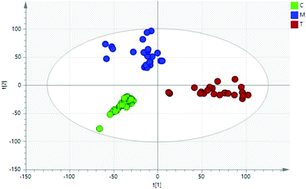当前位置:
X-MOL 学术
›
Food Funct.
›
论文详情
Our official English website, www.x-mol.net, welcomes your feedback! (Note: you will need to create a separate account there.)
Changes in the metabolite profile of breast milk over lactation stages and their relationship with dietary intake in Chinese women: HPLC-QTOFMS based metabolomic analysis
Food & Function ( IF 6.1 ) Pub Date : 2018-09-06 00:00:00 , DOI: 10.1039/c8fo01005f Kelei Li 1, 2, 3, 4 , Jiajing Jiang 4, 5, 6, 7 , Hailong Xiao 4, 7, 8 , Kejian Wu 4, 5, 6, 7 , Ce Qi 1, 2, 3, 4 , Jin Sun 4, 9, 10, 11 , Duo Li 1, 2, 3, 4, 5
Food & Function ( IF 6.1 ) Pub Date : 2018-09-06 00:00:00 , DOI: 10.1039/c8fo01005f Kelei Li 1, 2, 3, 4 , Jiajing Jiang 4, 5, 6, 7 , Hailong Xiao 4, 7, 8 , Kejian Wu 4, 5, 6, 7 , Ce Qi 1, 2, 3, 4 , Jin Sun 4, 9, 10, 11 , Duo Li 1, 2, 3, 4, 5
Affiliation

|
The aim of the present study was to comprehensively evaluate the changes in the metabolite profile of breast milk over lactation stages and their relationship with dietary intake in Chinese women by HPLC-QTOFMS based metabolomic analysis. The colostrum, transitional milk and mature milk of thirty healthy lactating women were collected for analysis. Eighty-four differential metabolites over lactation stages were identified, including 12 fatty acyls, 15 glycerolipids, 23 glycerophospholipids, 7 sphingolipids, 7 vitamins, 5 nucleotides-related metabolites, 2 amino acids, 1 amino acid derivate, 9 dipeptides, 1 steroid hormone, 1 energy-related metabolite and 1 amine. Partial least-squares regression analysis indicated that the metabolite profiles of the colostrum, transitional milk and mature milk have a strong relationship with dietary intake (R2 values were 0.92, 0.87 and 0.74, respectively). However, among the 84 differential metabolites over lactation stages, only two showed a strong relationship with dietary intake: 1,24,25-(OH)3 vitamin D3 was positively correlated with the dietary intake of meat and eggs, protein and fat; 11β-hydroxyprogesterone was negatively correlated with the dietary intake of fruit and carbohydrate. After adjusting for dietary intake, the variation trend of all the 84 differential metabolites over lactation stages remained unchanged. In conclusion, 84 differential metabolites in the breast milk of Chinese women over lactation stages were identified, and their variation trend was independent of dietary intake. These metabolites were partially different from those identified in previous metabolomic studies in the Western population. The present study is quite meaningful for understanding the variation of nutritional requirements in Chinese infants at different developmental stages and manufacturing optimal infant formulas for them.
更新日期:2018-09-06


























 京公网安备 11010802027423号
京公网安备 11010802027423号